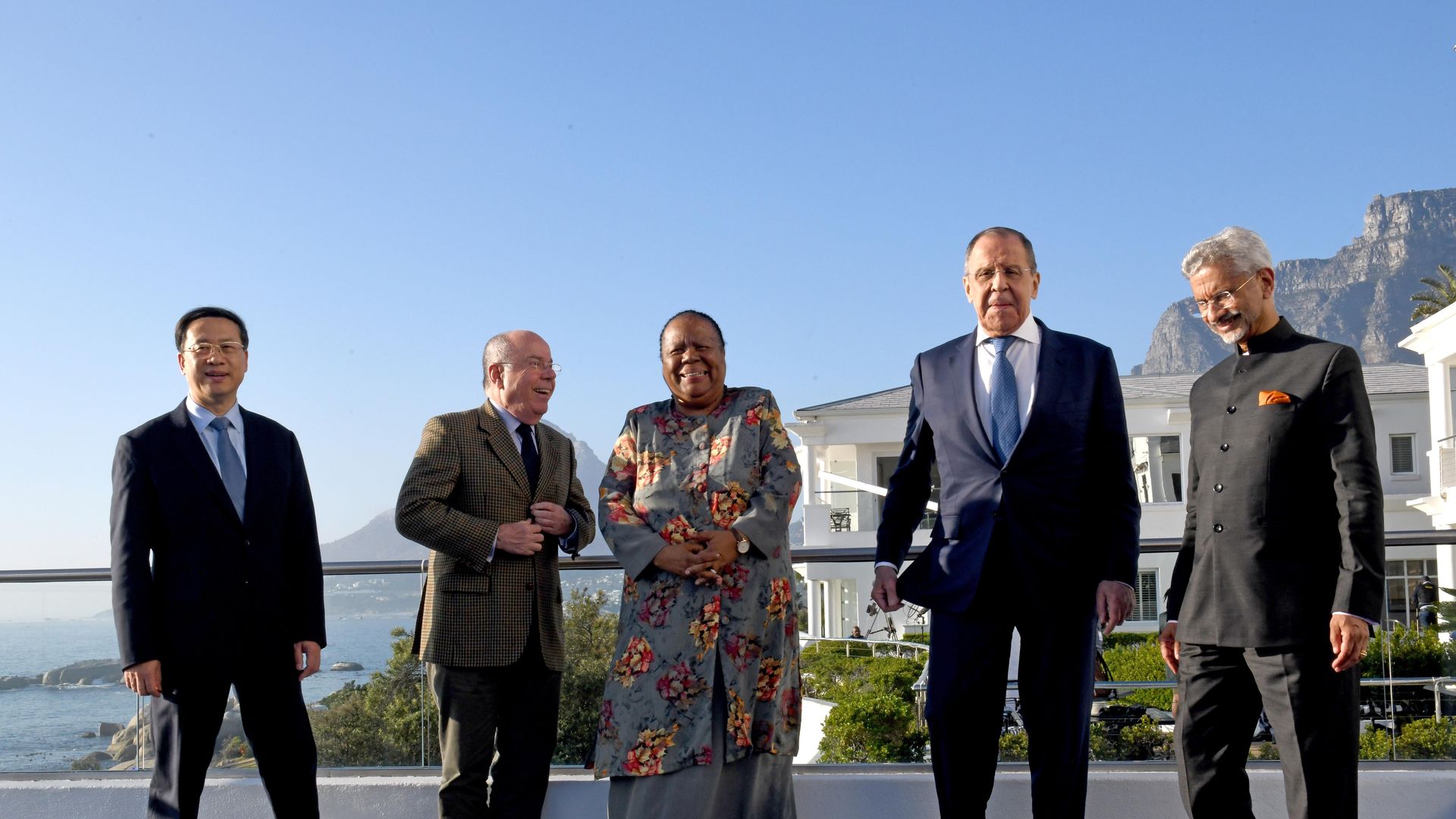
From left, Chinese Deputy Foreign Minister Ma Zhaoxu, Brazilian Foreign Minister Mauro Vieira, South African Foreign Minister Naledi Pandor, Russian Foreign Minister Sergey Lavrov and Indian Foreign Minister Subrahmanyam Jaishankar at Thursday's BRICS meeting in Cape Town. Photo: Handout via Getty
Two Russia-related controversies are gripping South Africa: U.S. accusations that weapons were shipped from Cape Town to Russia, and Vladimir Putin's invitation for an upcoming summit despite an international arrest warrant.
Why it matters: South Africa is trying to maintain its warm relations with Russia, its official neutrality on the war in Ukraine, and its economic relationship with the U.S. That juggling act is proving very difficult to sustain.
Driving the news: South Africa is hosting top diplomats from the other BRICS countries — Brazil, Russia, India and China — ahead of a leader-level summit in August.
- Foreign Minister Naledi Pandor said Thursday that the government is examining its "legal options" should Putin decide to attend the summit.
- MPs from the ruling African National Congress (ANC) have proposed legislation to nullify Pretoria's obligation to arrest leaders wanted by the International Criminal Court. Meanwhile, the opposition Democratic Alliance (DA) plans legal action to force authorities to arrest Putin if he visits.
- Influential former President Thabo Mbeki told a local radio station he expects the summit to be relocated: "Because of our legal obligations we have to arrest President Putin, but we can't do that."
Then there are the explosive allegations from U.S. Ambassador Reuben Brigety that weapons were secretly shipped from South Africa to Russia.
- A Russian cargo ship, the Lady R, turned off its transponder before making an unscheduled stop in December at a naval base in Cape Town, where it was loaded at night.
- Brigety said on May 11 that he would "bet my life" that weapons and ammunitions were loaded onto it — comments that reportedly angered not only his host country, but also some colleagues at the State Department, who didn't want a rift with Pretoria. He has since softened his tone but not walked back the claim.
- Senior South African officials have denied and angrily denounced the allegations, but President Cyril Ramaphosa appointed a retired judge to investigate them.
State of play: Like its BRICS partners Brazil, China and India, as well as many other countries in Africa, South Africa has largely refrained from directly criticizing Russia's invasion, abstained from UN votes on that topic, and called for peace talks.
- Ramaphosa also blamed NATO after the invasion and went ahead with military exercises with Russia in February.
The big picture: Many senior ANC figures first developed ties to Moscow — including education and military training, in some cases — when the Soviet Union was backing the anti-apartheid struggle. The countries have maintained close ideological links since the ANC took power in 1994.
- Nelson Mandela and his successor Mbeki criticized what they saw as an imbalanced global order, while also positioning South Africa as a "bridge" between the Global South and the economic powers in the West, says Christopher Williams, a research fellow at the University of the Witwatersrand in Johannesburg.
- Pretoria moved closer to Moscow and Beijing following the 2008 financial crisis, the election of Jacob Zuma in 2009, and South Africa's invitation to join the BRICS in 2010.
- A strategic partnership agreement signed in 2013 made Moscow the closest thing Pretoria has to a formal ally.
Yes, but: The economic relationship is fairly minimal, and a controversial multibillion-dollar nuclear power project Zuma pursued with Russia never got off the ground.
- Still, both Russia and South Africa regularly criticize what they see as the hypocrisy of the West and international institutions — for example, the ICC's decision to pursue war crimes charges over the invasion of Ukraine but not over the invasion of Iraq.
What to watch: The government appears to be looking for a work-around whereby the BRICS summit will be moved or Putin won't attend in person, Williams says. Meanwhile, Ramaphosa gave the panel investigating the Lady R. incident eight weeks to file its report.
- If Brigety's allegations are borne out, the U.S. will likely be disinclined to renew South Africa's preferential trade status, Williams says.
World - Latest - Google News
June 02, 2023 at 06:19AM
https://ift.tt/TB2s8VY
South Africa faces two Russia-related crises - Axios
World - Latest - Google News
https://ift.tt/rYZb4dB

No comments:
Post a Comment